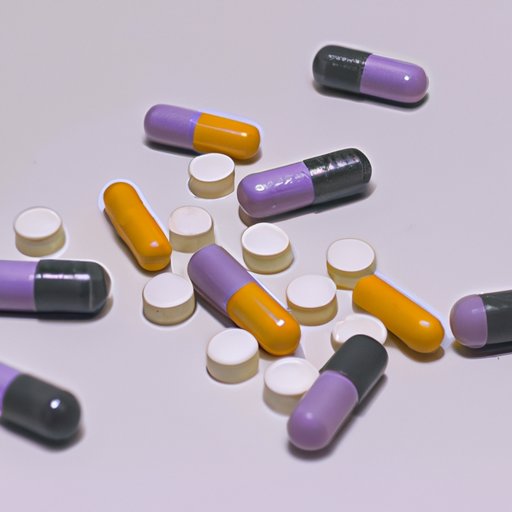
Introduction
Effexor is a prescription medication used to treat depression, anxiety, and panic disorders. It belongs to a class of drugs called serotonin-norepinephrine reuptake inhibitors (SNRIs). By increasing the levels of certain chemicals in the brain, Effexor can help regulate mood and emotions. While it is an effective treatment for many people, it’s essential to be aware of potential drug interactions when taking Effexor.
Drug interactions can be dangerous or even life-threatening. Certain medications can impact how Effexor works, leading to increased side effects or decreased effectiveness. It’s crucial to speak with your doctor or pharmacist before starting or stopping any medication to prevent any adverse reactions.
Top 5 Medications to Avoid Taking with Effexor
While there are many medications that may interact with Effexor, some are more significant than others. Here are five medications to avoid taking with Effexor:
1. Monoamine Oxidase Inhibitors (MAOIs)
MAOIs are used to treat depression and anxiety disorders but are generally only used as a last resort due to their potentially severe side effects. Taking Effexor with an MAOI can cause dangerously high levels of serotonin, a chemical in the brain that regulates mood. This condition, called serotonin syndrome, can cause confusion, agitation, and seizures.
2. Blood Thinners (Anticoagulants)
Effexor can interact with blood thinning medications such as warfarin, increasing the risk of bleeding. If you are taking either medication, your doctor may want to monitor your blood clotting ability more closely.
3. Nonsteroidal Anti-inflammatory Drugs (NSAIDs)
NSAIDs, such as aspirin and ibuprofen, can increase the risk of bleeding when taken with Effexor. They can also cause stomach bleeding and ulcers when taken for long periods, especially in people over 60.
4. Triptans for Migraines
Triptans and Effexor can increase the risk of serotonin syndrome when used together. Combining the two medications may cause a rapid heartbeat, hallucination, and confusion. Symptoms of serotonin syndrome can be life-threatening.
5. Cimetidine
Cimetidine, a drug used to treat heartburn and acid reflux, may interact with Effexor, leading to higher levels of the medication in your bloodstream. This interaction can cause increased side effects like headache, nausea, and dizziness.
Avoid Dangerous Drug Interactions: A Guide to Effexor Compatibility
It’s not just medications that can interact with Effexor. Certain foods, supplements, and drinks can also impact how this medication works in your body.
For example, drinking alcohol while taking Effexor can increase the risk of side effects such as dizziness, drowsiness, and impaired coordination. Drinking grapefruit juice or taking St. John’s wort can also increase blood levels of Effexor, leading to increased side effects.
If you are thinking of taking any new medication, supplement, or herb, it’s crucial to speak with your doctor or pharmacist first to ensure it won’t interact with Effexor.
Effexor and Other Drugs: Why Certain Combinations Can Be Risky
Effexor can interact with many different types of medications, both prescription and over-the-counter. Here are a few examples of the potentially risky drug interactions:
1. Antidepressants
Taking Effexor with other antidepressants such as Prozac or Zoloft can increase the risk of serotonin syndrome. Your doctor may need to monitor you closely and adjust your dosage accordingly.
2. Sleeping Pills and Benzodiazepines
Combining Effexor with sedatives like Ambien or Xanax can cause dangerously decreased breathing, leading to a coma or even death.
3. Opioids
Effexor and opioids, such as codeine or morphine, can increase the risk of serotonin syndrome and seizures.
The Dangers of Mixing Effexor with Certain Over-the-Counter Medicines
Certain over-the-counter medications can also interact with Effexor, leading to potentially dangerous side effects. Here are some examples:
1. Decongestants
Decongestants, such as Sudafed, can increase your heart rate and blood pressure when taken with Effexor. This interaction can cause chest pain, high blood pressure, and even a heart attack.
2. Cold Medications with Acetaminophen
Taking cold medicine with acetaminophen, like Tylenol Cold, can increase the risk of liver damage when taken with Effexor, especially with high dosages.
3. Antacids
Avoid taking antacids like Tums or Maalox with Effexor as they can decrease the absorption of the medication into your system, making it less effective.
Stay Safe with Effexor: What You Need to Know About Drug Interactions
The best way to stay safe when taking Effexor is to be informed about potential drug interactions and to speak with your healthcare provider if you have any concerns or questions.
If you are taking any new medication, supplement, or herb, be sure to let your doctor or pharmacist know so they can check for interactions with Effexor. If you experience any new or worsening side effects, such as headaches, dizziness, or nausea, contact your healthcare provider right away.
Understanding the Risks: Common Medications That Should Not Be Taken with Effexor
While many medications can interact with Effexor, some are more common than others. Here are a few examples:
1. Blood Pressure Medications
Effexor can interact with blood pressure medications like Clonidine, leading to high blood pressure, headaches, and blurred vision.
2. Proton Pump Inhibitors (PPIs)
PPIs like Nexium or Prilosec can decrease the effectiveness of Effexor due to their ability to reduce stomach acid levels. Speak with your doctor if you need to take a PPI while taking Effexor.
3. Antihistamines
Common antihistamines like Benadryl may cause increased drowsiness when taken with Effexor. It’s best to avoid these medications or take them only under your doctor’s supervision.
Conclusion
Effexor is a remarkable medication used to treat various mental health problems, but precautions should be taken to ensure your safety. Always speak to your healthcare provider when starting a new medication, supplement or herb. It is also essential to avoid drinking alcohol, grapefruit juice, and taking over-the-counter medicines that may impact how Effexor works in your body. By taking these precautions, you can help prevent drug interactions and stay safe while taking Effexor.
Remember, if you have any concerns or questions about taking Effexor, don’t hesitate to speak to your healthcare provider.





